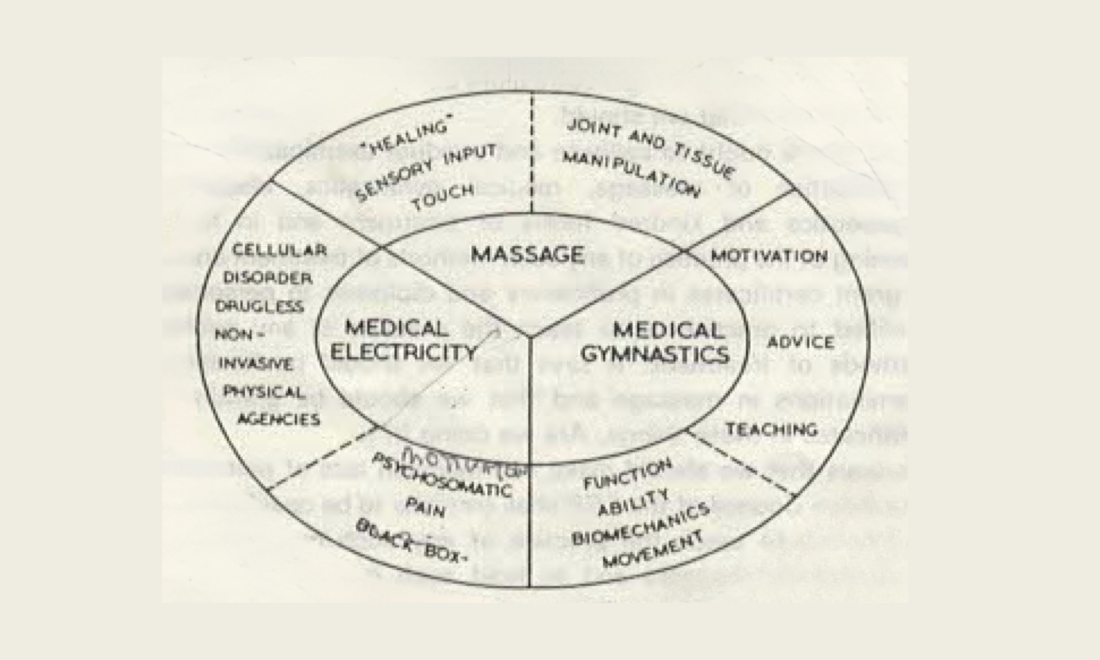The seminal paper “Physiotherapy is Handling” was presented by Joyce Williams at the Chartered Society of Physiotherapy (CSP) Founders’ Lecture at the CSP Annual Congress in 1985 and was reproduced in the Physiotherapy Journal in February 1986 (Vol.72, no.2). Joyce’s biographical details current at the time of publication appear following the summary at the top of the paper. Joyce was a distinguished Chair of the CSP from 1982 until 1985 and was well known internationally as well as nationally for her outstanding contribution to the development of physiotherapy as a profession in the United Kingdom.
The CSP Annual Founders’ Lecture is held in memory and celebration of the great initiatives and contributions of the Founders of the Society from 1894:
A summer afternoon in the year 1894, two anxious young women in earnest conversation. Rosalind Paget, the elder, tall, slight and distinguished, is dressed in the close fitting bonnet and dark uniform dress of the Queen’s Nurses; Lucy Robinson, the younger, round-about in build, is enveloped in the huge circular cloak designed for midwives, so designed that they could walk safely through the rain clasping under this cloak the precious basket from which the juvenile mind of the period believes the baby will emerge.”
Rosalind and Lucy are both practising massage or “medical rubbing”, a form of treatment now finding its way in the armamentarium of the medical profession.”
Lucy and Rosalind were very concerned about the “noisome rumours”, not only in the press but also in medical journals about articles on what had come to be known as “massage scandals”.
“Suddenly Lucy exclaims “let’s form a Society,” Rosalind is horrified: “A Society of massage at this time! What would people think, what would the doctors say?”
But the seed has been sown and Lucy had won. Before the month is out certain of their colleagues have been consulted and the date of a meeting is fixed. In the early Autumn ten tried and trusted workers enter the meeting as ten individual women practising medical rubbing and emerge as the ‘The Society of Trained Masseuses'” (Wicksteed, 1948)
The Founders’ Lecture was proposed in 1914 and the first lecture took place in 1915.
I was working my way through a batch of old papers as part of a project and came across this excellent, powerful and brilliantly argued paper written by my friend and mentor from whom I learned so much and thought how amazingly perceptive, persuasive and true her argument was and to me, still is. Joyce kindly gave me her blessing to get the paper published again here – Physiotherapy is Handling.
In her lecture Joyce explains that the founders of the profession were “selling” trained, respectable masseuses but for today’s physiotherapy it is less clear.
Clearly the world around us is changing rapidly and things are not as they were in the 1980s, the many needs and demands for the skills, knowledge and wide-ranging ability and insights of physiotherapists expand rapidly, and this will continue to increase much faster than the ability to satisfy this pressure worldwide. The traditional hands on and one-to-one physiotherapy remains as true today as ever and is the core and foundation on which our profession is built, “Physiotherapy is Handling”. However, it has become increasingly necessary for us to develop more expansively upon the essential and core elements to support and influence for example, educators, trainers, carers and others as well as patients with long term conditions who have their own contributions to make, based on the insights, knowledge and learning we must pass on. If asked: “What is it that distinguishes physiotherapy from all other professions and services?” and “What is it that marks what we do as unique compared with other professions and services?” I would answer that the foundation and uniqueness of our profession remains “handling” as Joyce Williams argued forty years ago.
References:
Wicksteed, JH. 1948. The Growth of a Profession.


Physiotherapie ist und bleibt Handling- das ist der Kern auch für Wachstum und Fortschritt!
Ein guter Beitrag, danke!
B. Böttcher